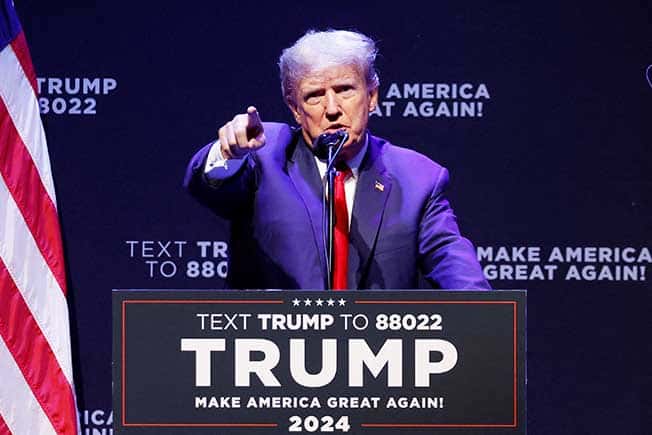A new judge takes over leadership of the U.S. trial court in Washington on Friday, inheriting oversight of secret proceedings involving special counsel criminal investigations into former President Donald Trump’s retention of classified documents and efforts by him and his allies to undo his 2020 election loss.
James “Jeb” Boasberg becomes chief judge of the U.S. District Court for the District of Columbia, replacing Judge Beryl Howell as her seven-year term comes to an end.
The chief judge has sole discretion over sealed federal grand jury proceedings. That means Boasberg will immediately take over responsibility for handling certain issues that may arise in the special counsel investigations involving Trump, who in November announced he was seeking the 2024 Republican presidential nomination.
Boasberg also would assume the same responsibilities if a grand jury is formed in a separate special counsel investigation into President Joe Biden’s handling of classified documents after leaving the vice presidency. Biden, a Democrat, is expected to seek re-election in 2024.
As chief judge, Boasberg is poised to rule on certain legal arguments raised in the grand jury probes, including efforts to restrict witnesses from testifying. Grand jury proceedings are kept from public view.
In an interview, Boasberg declined to comment on his impending grand jury oversight duties. He praised his predecessor, saying the court was fortunate to have had Howell as its leader “in this very fraught period.”
“She’s led the court in a terrific way through COVID and dislocations, and she also has maintained a very cohesive court not driven by partisan divides,” Boasberg said.
Boasberg, an appointee of Democratic President Barack Obama, has served on the court since 2011. He previously was picked in 2002 by Republican President George W. Bush for the local D.C. Superior Court. Both times he was easily confirmed by the U.S. Senate.
Special Counsel Jack Smith, appointed by Attorney General Merrick Garland in November to handle the two Trump investigations, is presenting evidence to multiple grand juries. At issue are Trump’s retention of classified documents at his Mar-a-Lago estate in Florida after leaving office in January 2021 and attempts to interfere with the peaceful transfer of power following Trump’s loss to Biden.
Another special counsel, Robert Hur, was named by Garland in January to look into classified records found at Biden’s home in Delaware and former office in Washington.
No sitting or former president has ever been indicted.
Boasberg, a tall and deep-voiced former member of Yale’s basketball team, is well-prepared to handle the cases and lead the court through the intense scrutiny any indictment would bring, according to fellow judges and his former law clerks.
U.S. District Judge Casey Cooper in Washington, who has known Boasberg since they attended Yale together, said Boasberg is “exactly the sort of independent thinker you would want in that position,” calling him “incredibly balanced and thoughtful and fair.”
Howell praised Boasberg’s readiness to take on high-profile and novel issues, “whether arising out of the grand jury or not, that draw the spotlight of national attention.”
During her tenure as chief judge, Howell regularly heard legal arguments in special counsel investigations.
These included a challenge by an unidentified, foreign-owned company to a grand jury subpoena issued by then-Special Counsel Robert Mueller as he examined the 2016 Trump campaign’s contacts with Russians and, more recently, Republican congressman Scott Perry’s bid to block investigators from accessing his cellphone and messages relating to actions involving the 2020 election results.
Boasberg has faced tough assignments before. In 2020 and 2021, he presided over the U.S. Foreign Intelligence Surveillance Court, which hears government requests for secret surveillance warrants. His tenure came after the Justice Department’s internal watchdog had highlighted failures in the department’s process for seeking the secret warrants.
Boasberg oversaw Special Counsel John Durham’s criminal case against former FBI lawyer Kevin Clinesmith, who pleaded guilty in 2020 to altering an email used to justify a government wiretap of former Trump campaign adviser Carter Page. Boasberg sentenced Clinesmith to a year of probation and 400 hours of community service.
After the 2020 election, Boasberg rejected a challenge by Republican state lawmakers and others who were contesting Trump’s defeat and had asked him to block congressional certification of Biden’s election win.
“Courts are not instruments through which parties engage in such gamesmanship or symbolic political gestures,” wrote Boasberg, who referred the lawyer behind the case, Erick Kaardal, to the court’s grievance committee for acting with “potential bad faith.”

